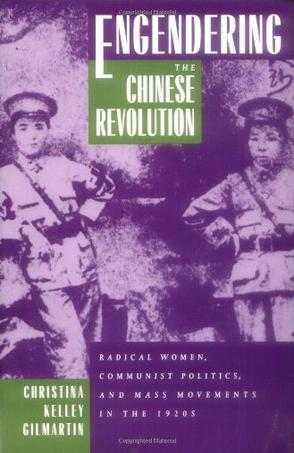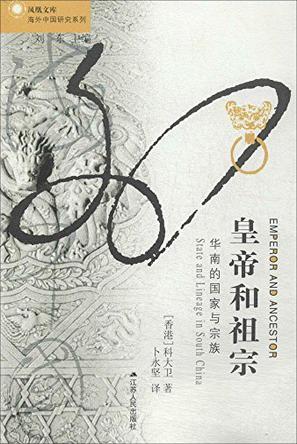-

Engendering the Chinese Revolution
-

孔飞力中国学研究
《孔飞力中国学研究》主要环绕孔飞力撰写的学术著作展开研究。基本思路是:从方法论上,遵循史学史与史学理论研究的一般方法,分析孔飞力中国近代史研究的基本历程。其二,运用科学的辩证思维方法,历史与逻辑、分析与综合、归纳与演绎相结合,力图在阐述孔飞力各个阶段成果的基础上,概括孔飞力的中国史观、中国史研究特色、方法,评价其学术地位和影响。其三,借鉴运用多学科的研究方法。由于孔飞力的历史研究借鉴了社会学、政治学、人类学、心理学等多门社会科学的研究方法,因此,运用相关的社会科学的方法和理论去研究是必要的。 -

Practicing Kinship
Presenting a new approach to the history of Chinese kinship, this book attempts to bridge the gap between anthropological and historical scholarship on the Chinese lineage by considering its development in terms of individual and collective strategies. Based on a wide range of newly available sources such as lineage genealogies and stone inscriptions, as well as oral history and extensive observation of contemporary ritual practice in the field, this work explores the historical development of kinship in villages of the Fuzhou region of southeastern Fujian province. In the late imperial period (1368-1911), the people of Fuzhou compiled lengthy genealogies, constructed splendid ancestral halls, and performed elaborate collective rituals of ancestral sacrifice, testimony to the importance they attached to organized patrilineal kinship. In their writings on the lineage, members of late imperial elites presented such local behavior as the straightforward expression of universal and eternal principles. In this book, the author shows that kinship in the Fuzhou region was a form of strategic practice that was always flexible and negotiable. In using the concepts and institutions of kinship, individuals and groups redefined them to serve their own purposes, which included dealing with ethnic differentiation, competing for power and status, and formulating effective responses to state policies. Official efforts to promote a neo-Confucian agenda, to register land and population, and to control popular religion drove people to organize themselves on kinship principles and to institutionalize their kinship relationships. Local efforts to turn compliance with official policies, or at least claims of compliance, to local advantage meant that policymakers were continually frustrated. Because kinship was constituted in a complex of representations, it was never stable or fixed, but fluid and multiple. In offering this new perspective on this history of Chinese lineage practices, the author also provides new insights into the nature of cultural integration and state control in traditional Chinese society. -

Popular Religion in China
The institution of local festivals and temples is not as well known as that of ancestor worship, but it is just as much a universal fact of Chinese life. Its content is an imperial metaphor, which stands in relation to the rest of its participants' lives as the poetry of collective vision, theatrically performed, built and painted in temples, carved and clothed in statues. Stephan Feuchtwang has brought together unpublished as well as published results of his own and other anthropologists' fieldwork in the People's Republic of China and Taiwan and put them into an historical, political and theoretical context. Students of anthropology will be intrigued. This is not a religion of a Book. Nor is it one of the named religions of China. Popular religion includes some elements of both Buddhism and the former imperial cults, more of Daoism, but it is identifiable with none of them. It is popular in the sense of being local and true of the China of the Han, or Chinese-speaking people, where every place had or has its local cults and the festivals peculiar to them. Its rites, in particular offerings of incense and fire, suggest a concept of religion. It is quite different from theories of religion based on doctrine and belief. Students of politics will also find here vital and new perspectives. Politics is never far from religion, least of all in the People's Republic of China or colonial and post-colonial Taiwan. -

Chinese Local Elites and Patterns of Dominance
This important volume affords a panoramic view of local elites during the dramatic changes of late imperial and Republic China. Eleven specialists present fresh, detailed studies of subjects ranging from cultivated upper gentry to twentieth-century militarists, from wealthy urban merchants to village leaders. In the introduction and conclusion the editors reassess the pioneering gentry studies of the 1960s, draw comparisons to elites in Europe, and suggest new ways of looking at the top people in Chinese local social systems. Chinese Local Elites and Patterns of Dominance lays the foundation for future discussions of Chinese elites and provides a solid introduction for non-specialists.Essays are by Stephen C. Averill, Lenore Barkan, Lynda S. Bell, Timothy Brook, Prasenjit Duara, Edward A. McCord, William T. Rowe, Keith Schoppa, David Strand, Rubie S. Watson, and Madeleine Zelin. This important volume affords a panoramic view of local elites during the dramatic changes of late imperial and Republic China. Eleven specialists present fresh, detailed studies of subjects ranging from cultivated upper gentry to twentieth-century militarists, from wealthy urban merchants to village leaders. In the introduction and conclusion the editors reassess the pioneering gentry studies of the 1960s, draw comparisons to elites in Europe, and suggest new ways of looking at the top people in Chinese local social systems. Chinese Local Elites and Patterns of Dominance lays the foundation for future discussions of Chinese elites and provides a solid introduction for non-specialists.Essays are by Stephen C. Averill, Lenore Barkan, Lynda S. Bell, Timothy Brook, Prasenjit Duara, Edward A. McCord, William T. Rowe, Keith Schoppa, David Strand, Rubie S. Watson, and Madeleine Zelin. More recent articles stressing the limits of capitalist development and a consolidation of the merchant and gentry classes include Huang Qichen and Ye Xian'en 1987. On some socioeconomic effects of Southeast Asian trade on Fujian and ... -

皇帝和祖宗
《皇帝和祖宗:华南的国家与宗族》所要回答和解决的问题是:朝廷的法典条文,民间的礼仪习俗,二者如何交织在一起指导着“华南”这个有意识的、历时数百年的地域建构进程?《皇帝和祖宗:华南的国家与宗族》显示:历代王朝都致力于华南的政治整合。要培养出敬畏官府、纳粮当差、安分守己的良民。琏着王朝在华南的军事征讨、行政规划,一套关于权力的文化语言也渗透华南。这套语言有两个互相发明的关键词“皇帝”、“宗族”。它们渗透到一切礼节、身份、地位、财产权、商业习惯、社会流动、社区构建之中。华南与王朝中央之间的正统纽带,不仅建立于里甲与祀典之上。也建立在“宗族”这套语言之上。